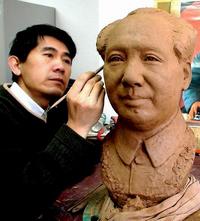I know, we’ve talked this subject to death, and everyone knows where I stand: I see Mao as having being nothing but bad for China, notwithstanding the few golden years of the pre-GLF 1950s when it looked like he was going to be a true reformer. I respect the rights of Chinese people to view Mao however they choose, and I understand why many of them see him as a hero, even if I disagree.
The NYT takes a look today at this question and notes why Chinese citizens on the “right” see Mao as a Machiavellian killer while those on the “left” see him as a liberator and the man who brought stability to China. It’s good to see that these topics are at least debatable, and to see there are a lot of Chinese “netizens” who aren’t toeing the party line. And this story includes an interesting twist.
…45 years ago, on May 16, 1966, this same man began the Cultural Revolution, an orgy of political violence that killed perhaps two million Chinese.
Mao’s preeminence in China is linked to his role in founding the People’s Republic in 1949. Yet his controversial political legacy, of which the Cultural Revolution is just one example, is growing more, not less, disputed, with time.
At stake is nothing less than long-stalled political reform, say some Chinese analysts and retired Communist Party officials.
“An honest, earnest, serious assessment of Mao based on facts” is “necessary,” Yawei Liu, director of the Carter Center’s China Program in Atlanta, said in an e-mail.
Mao’s legacy overshadows China to this day, so “without such a thorough verdict, it would be hard for China to launch meaningful political reform,” Mr. Liu said.
In China, the debate over Mao’s legacy is growing increasingly heated, conducted via Web sites, articles and books.
Here’s the “news”part of the article. Is the CCP really considering writing Mao out of the government’s policies and documents?
A recent essay by the liberal economist Mao Yushi, “Returning Mao Zedong to his Original Person,” has highlighted the controversy.
Mr. Mao, who is no relation to Mao Zedong, accused the former leader of hypocrisy and unusual cruelty.
The Cultural Revolution was merely a ploy to destroy his many critics after the disaster of the Great Leap Forward famine, which killed around 30 million people, Mr. Mao wrote.
Evidence of cruelty is found, for example, in Mao’s indifference to the fate of friends he drove to suicide, wrote the economist, and that of President Liu Shaoqi, whom Mao first attacked, then pretended to save, only to have Mr. Liu expelled from the party on his 70th birthday, before dying, untended, in jail in 1969.
A document circulating online purporting to detail a proposal by top Communist Party officials to remove Mao Zedong Thought from party work, documents and policies, has also sharpened debate.
The supposed Politburo document, No. 179, dated Dec. 28, 2010, is said to have been proposed by Xi Jinping, the man expected to become China’s next president, and Wu Bangguo, the head of the National People’s Congress.
No one knows if it’s real or fake (I presume it’s fake), but it has ignited the issue again. And I see that as a good thing. I think the more people look hard at all that Mao actually did they’ll have no choice but to see he was far from 70 percent good. And I have no illusions; people won’t let go of their opinions easily, and Mao’s legacy is one of those burning issues that inspire extreme opinions (and a lot of irrationality). At least now more people will be discussing it.


Comments